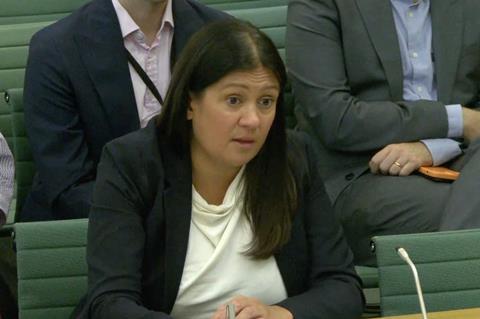
UK secretary for the government’s Department for Culture, Media and Sport (DCMS) Lisa Nandy has called out the streamers and Banijay for not funding the UK’s burgeoning Creative Industries Standards Authority (CIISA).
More support for the exhibition sector and “frustrations” with AI legislation were also key talking points for Nandy’s first culture, media and sport committee grilling after retaining her post in the weekend’s cabinet reshuffle.
Nandy took aim at European production and distribution company Banijay and non-specific streamers for not providing the voluntary contribution needed to support the running of the industry-backed body.
“I’m having conversations with the streamers, who so far have been very reluctant to sign up to CIISA,” said Nandy. “I am also genuinely quite appalled at learning from CIISA that Banijay, the production company behind recent headlines [in reference to scandals surrounding the behaviour of Masterchef UK hosts, Gregg Wallace and John Torode], had committed to sign up to CIISA and has not yet signed up to funding.
”If that has changed in the few hours since we’ve been here, I’d be delighted to hear it. But we do take a very dim view of companies that have had these issues, that have been heavily criticised for not having dealt with them, and have not made good on those commitments.”
A spokesperon for Banijay told Screen in response: “Banijay UK has made it very clear that it is supportive of CIISA and welcomes the concept of an independent body that sets standards for behaviour and addresses issues in the industry. We’ve embraced their standards framework and have engaged with the secretary of state’s office and officials at DCMS as well as directly with CIISA.
“We have offered to help fund CIISA during its development phase and continue to collaborate closely with CIISA. CIISA have insisted that they will only countenance full annualised funding. Together with several other large production groups and studios, we will continue these conversations and look forward to helping develop and define CIISA’s remit.”
No organisation is expected to contribute more than 0.1% of annual UK turnover to CIISA. Nandy reiterated that she is not ruling out government intervention if the industry does not financially commit to CIISA.
“I’ve had these discussions extensively with CIISA, which we strongly support as a voluntary initiative,” she said. “I have made it clear that if in the future we believe it’s necessary for this to become statutory, that is something that the government is very open to.”
Nandy commended the BBC “who have shown a real leadership role in this”.
She added that the culture department and CIISA agree that the standards body will “be more effective if we can persuade a wider range of organisations to sign up [to funding]”.
AI “frustrations”
Nandy rowed back on the government’s previous stance on AI and copyright. The government has embarked on a series of cross-industry consultations and roundtables on the issue of AI and copyright, beginning in December 2024. Its initial preferred option was an opt-out model, in which copyright owners must proactively opt out of their work being used for training AI models.
She said: “We’ve learned through that consultation process that having a preferred model was not the right approach, and that is no longer our position. We do not have a preferred option.”
In June, the UK’s Data (Use and Access) Bill passed through parliament, following much pushback in the House of Lords, the UK’s second chamber. The bill was passed without the protections for creatives that key industry figures and their House of Lords backers were hoping to secure.
The bill was introduced by the government in October of last year and covers a range of data regulations with an aim to “unlock the secure and effective use of data for the public interest, without adding pressures to the country’s finances”.
The sticking point for the creative industries was the fear that it would allow tech companies to train AI on copyrighted material without the consent of the rights holder. The government said it was carrying out additional consultation about copyright.
“AI offers enormous opportunities, but it also offers huge threats,” noted Nandy. “The debate has become very binary – you’re either pro-AI, or pro-creative industries. My view has always been that the UK’s great strength, our superpower is the data, the human data, and content produced by the creative industries. If we don’t protect the creative industries, we haven’t got a hope of being an AI superpower.
“I don’t think as a government that we did enough collectively, and I take full responsibility for this, to be clear enough about that, and I think we allowed the debate to become very binary. You’re either for creative industries or for AI.
“We had deliberately tried to separate out the legislation we were passing in this area from the particular issue of AI and copyright. I don’t think that worked.”
She continued, “I haven’t said this before publicly, but one of my great frustrations with that is because it was a DSIT [Department for Science, Innovation and Technology]-led bill, I was not able to be as present in the debate in parliament as my counterpart and friend [DSIT secretary of state] Peter Kyle. It became a debate that was very much about AI, where the creative industries needed to see that their secretary of state was also very visible, and the parliamentary process and the rules didn’t allow for that.”
Pressed on when the public can expect to see the results of the AI consultations and roundtables, which has had around 11,500 responses, Nandy refused to commit to a timeframe.
“We know it’s urgent,” she said, but avoided questions on whether it could be by the end of this calendar year, or financial year.
UK cinema support
Nandy also used the platform to throw her weight behind supporting UK cinemas. “We’ve been looking at investment in film infrastructure, and particularly around cinemas, which are often the only cultural institution in many parts of the country… We’re looking at what we can do potentially to ensure that cinemas, and especially independent cinemas, are seen as critical cultural infrastructure and eligible for the funding that other cultural institutions are eligible for.”
The UK exhibition sector has been calling for a cut to VAT on cinema tickets, akin to the temporary 5% rate during the pandemic.
Currently, admission charges to museums, galleries, art exhibitions and zoos, plus theatrical, musical or choreographic performances ‘of a cultural nature’ qualify for exemption from VAT on admission charges.
However, the government appeared to rule out adding cinemas to this list in its response to the CMS committee’s inquiry into British film and high-end TV earlier this year. “VAT reliefs can add complexity and administrative cost to the tax system and create opportunities for non-compliance,” the government said at the time.

























No comments yet